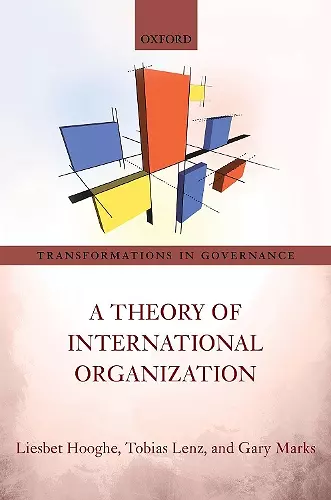A Theory of International Organization
Tobias Lenz author Liesbet Hooghe author Gary Marks author
Format:Hardback
Publisher:Oxford University Press
Published:29th Aug '19
Currently unavailable, and unfortunately no date known when it will be back
This hardback is available in another edition too:
- Paperback£28.99(9780198845072)

Why do international organizations (IOs) look so different, yet so similar? The possibilities are diverse. Some international organizations have just a few member states, while others span the globe. Some are targeted at a specific problem, while others have policy portfolios as broad as national states. Some are run almost entirely by their member states, while others have independent courts, secretariats, and parliaments. Variation among international organizations appears as wide as that among states. This book explains the design and development of international organization in the postwar period. It theorizes that the basic set up of an IO responds to two forces: the functional impetus to tackle problems that spill beyond national borders and a desire for self-rule that can dampen cooperation where transnational community is thin. The book reveals both the causal power of functionalist pressures and the extent to which nationalism constrains the willingness of member states to engage in incomplete contracting. The implications of postfunctionalist theory for an IO's membership, policy portfolio, contractual specificity, and authoritative competences are tested using annual data for 76 IOs for 1950-2010. Transformations in Governance is a major academic book series from Oxford University Press. It is designed to accommodate the impressive growth of research in comparative politics, international relations, public policy, federalism, environmental and urban studies concerned with the dispersion of authority from central states up to supranational institutions, down to subnational governments, and side-ways to public-private networks. It brings together work that significantly advances our understanding of the organization, causes, and consequences of multilevel and complex governance. The series is selective, containing annually a small number of books of exceptionally high quality by leading and emerging scholars. The series targets mainly single-authored or co-authored work, but it is pluralistic in terms of disciplinary specialization, research design, method, and geographical scope. Case studies as well as comparative studies, historical as well as contemporary studies, and studies with a national, regional, or international focus are all central to its aims. Authors use qualitative, quantitative, formal modeling, or mixed methods. A trade mark of the books is that they combine scholarly rigour with readable prose and an attractive production style. The series is edited by Liesbet Hooghe and Gary Marks of the University of North Carolina, Chapel Hill, and the VU Amsterdam, and Walter Mattli of the University of Oxford.
Hooghe, Lenz and Marks have written a first-rate book that sheds new light on classic questions of authority and institutional design, offers fascinating insights into the way IOs operate and evolve, and presents a range of new puzzles for researchers to explore. It deserves to be widely read. * Charles B. Roger, The Review of International Organizations *
Why have states in the post-World War era conferred ever-growing authority on international organizations? In this amazingly ambitious book, Liesbet Hooghe, Tobias Lenz, and Gary Marks convincingly dissect the authority of IOs over time and across space. They trace its sources to the scale and community of governance, and explain why general-purpose and task-specific IOs are distinctively different creatures. At a time when IOs are increasingly challenged, this book offers a profound understanding of the drivers and conditions of international governance. * Professor Jonas Tallberg, Department Of Political Science, Stockholm University *
Deep thinking and theorizing as well as profound and methodologically advanced empirical analysis - if you ask for the impossible and want to have both in one book, this one has it. A Theory of International Organization is at its core about the tension between scale and community. It develops a sophisticated and encompassing set of insights into the working of International Organizations in an interdependent world constituted of (mostly) national communities. This book is one of the most important contributions to a new wave of theorizing about world politics that overcomes old schisms. It is a must-read for all serious students of International Relations. * Michael ZÜRN, Director At The Wzb Berlin Social Science Center,Professor Fu Berlin, Wzb Berlin Social Science Center *
This sophisticated volume puts the social back into the international social contract among states. There is not an account of international organizations available today that more skillfully and persuasively combines the best of liberal and constructivist theory. Read it, and you will gain new insights into the stresses and strengths of the liberal international order. * Beth Simmons, Andrea Mitchell University Professor In Law,Political Science And Business Ethics, Penn Law *
This path-breaking book theorizes more than ten years of research on international organizations (IOs) at the global and regional levels by the authors. At a time when IOs are under increasing political pressure, the authors offer a post-functionalist theory of IOs. While interdependence explains the demand for IOs, degrees of transnational communities account for the variation in IO political authority. Required reading for anybody concerned about global governance! * Thomas Risse, Professor of International Relations, Freie Universität Berlin *
This impressive fourth volume in the series on postfunctionalist governance advances a theory of community and norms as the basis for global governance to explain the variation in when and how states cooperate. To test their theory the authors analyze design features across a broad range of important international institutions. As a general theory and building block dataset, the book provides a foundation for the next generation of research on international cooperation. * Christina L. Davis, Professor, Department of Government, Harvard University *
ISBN: 9780198766988
Dimensions: 242mm x 165mm x 20mm
Weight: 506g
220 pages